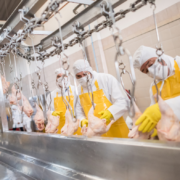
Reid Maki is the director of child labor advocacy at the National Consumers League and he coordinates the Child Labor Coalition.
It’s been referred to as a “ticking time bomb,” the coronavirus and its potential impact on farmworkers—the incredibly hard-working men, women, and children who pick our fruits and vegetables and provide other vital agricultural work. Farmworkers perform dirty, back-breaking work, are notoriously underpaid for it, and now face great risk from COVID-19.
Farmworker advocacy groups that National Consumers League (NCL) works with or supports—such as Farmworker Justice, the Coalition of Immokalee Workers, the United Farmworkers of America (UFW), the Farm Labor Organizing Committee, and a national cadre of legal aid attorneys—have spent weeks strategizing about ways to protect the community they know is especially vulnerable to the virus.
Advocates have reached out to administration officials and Congress for desperately needed resources to support impoverished farmworkers with little to show for it. Despite their essential contributions to the economy, farmworkers have been cut out of the emergency relief packages. The Trump Administration has even revealed plans to lower pay for agricultural guest workers who sacrifice home and family to come to the United States to perform arduous farm labor. Advocates fear that decreasing guest worker wages would drive down wages for farmworkers already living and working in the United States.
Farmworkers are poor, with extremely limited access to healthcare and, due to their poverty, often work through illness. The risks of an outbreak is especially great because workers often toil in close physical proximity to one another as they harvest, ride to the fields in crowded buses and cars, have limited access to sanitary facilities, including hand-washing, and often live in overcrowded, dilapidated housing.
The majority of farmworkers are immigrants from Mexico or are the children of Mexican immigrants. The community is socially isolated from mainstream America. Poverty forced many farmworkers to leave school at an early age. It also causes them to bring their children to work in the fields so that child labor can supplement their meager incomes. Language and cultural barriers further their isolation. NCL, through the Child Labor Coalition (CLC), which it founded and co-chairs, has committed to the fight to fix the broken child labor laws that allow children in agriculture to work at early ages—often 12—and to begin performing hazardous work at age 16.
When the virus began to move into America’s rural areas, many socially- and culturally-isolated farmworkers hadn’t heard about the virus. Some were confused that the grocery store shelves were empty and that the bottled water they usually buy suddenly cost much more.
In some cases, farmworkers reported that the farmers they work for have not told them about the virus or the need to take special precautions while working. Farmworkers face an alarming dearth of protective equipment. Many farmworkers groups, including UFW and Justice for Migrant Women, are urgently racing to provide masks and other protective gear.
A farmworker with COVID-19 is unlikely to know he or she has it and, therefore, very likely to keep working and infect their family and coworkers. Recently, a growers group tested 71 tree fruit workers in Wenatchee, Washington, according to a *report in the Capital Press newspaper. Although none of the workers were showing symptoms of COVID-19, 36 workers—more than half—tested positive!
The conditions faced by farmworkers are a “superconductor for the virus,” noted advocate Greg Asbed of the Coalition of Immokalee Workers in a New York Times opinion piece, in which he concluded that “the U.S. food supply is in danger.”
The current circumstances reminded Asbed of a previous crisis: “A century ago in ‘The Jungle,’ Upton Sinclair wrote about how the teeming tenements and meatpacking houses where workers lived and labored were perfect breeding grounds for tuberculosis as it swept the country. Now there is a new pathogenic threat and the workers who feed us are once again in grave danger,” said Asbed, adding that the “ two most promising measures for protecting ourselves from the virus and preventing its spread—social distancing and self-isolation—are effectively impossible in farmworker communities” because farmworkers live and work so closely together.
The looming food crisis is not just an American phenomenon, reported the New York Times. “The world has never faced a hunger emergency like this, experts say. It could double the number of people facing acute hunger to 265 million by the end of this year,” noted reporter Abdi Latif Dahir. “The coronavirus pandemic has brought hunger to millions of people around the world. National lockdowns and social distancing measures are drying up work and incomes, and are likely to disrupt agricultural production and supply routes—leaving millions to worry how they will get enough to eat,” added Dahir.
An article in The Washington Post warned that, in the United States, the farm–to-grocery distribution system is breaking down under the strain of the virus and that farmers are plowing in fields of crops. The Trump administration has announced a $19 billion plan to buy agricultural products and get them to food banks, which are experiencing shortages and, in some cases, mile-long lines of cars waiting for help.
In the United States, the federal government’s responses have been focused on helping farmers—which is fine; we all want farmers to be helped—but we cannot forget or neglect the needs of desperately poor farmworkers. In the absence of federal aid, some states are working to protect vulnerable farmworker populations. To help achieve social-distancing, Washington State has set housing rules requiring guest workers have double the current space.
Wisconsin issued similar rules requiring six-foot social distancing for farmworkers as they work in the fields, ride on buses, and sleep in grower-provided housing. The plan mandates protections for farmworkers who acquire the virus and calls for fines of up to $500 for violations.
In an April 15 letter, Pennsylvania’s Governor Tom Wolf urged the U.S. Department of Agriculture to “take swift and decisive action to publicize and implement a plan to immediately and equitably stabilize the agriculture industry, and to support agriculture producers, food processors, workers, and local food systems, regardless of the size of the operation. This plan must include resources, guidance, and protection for these workers,” Wolf continued. “Every sector of agriculture, food processing and distribution, retail, grocery stores, and farmers markets are negatively impacted by COVID-19 and need support.”
“The closing of many child care facilities has meant many farmworker women must stay home with children, which translates to lost income and fewer workers for farmers,” noted Cleo Rodriguez, a CLC-member who heads the National Migrant and Seasonal Head Start Association.
“The closing of schools may mean that younger teens are increasingly pulled into agricultural child labor,” suggested Norma Flores López, who heads the CLC’s efforts to protect farmworker children. “We’re very concerned with the number of children that are going to be working in the fields,” said Flores López, adding that child labor increases children’s risk of exploitation, wage theft, and sexual exploitation.
Concerned about these developments, the CLC wrote letters this week to several appropriators and the Committee on Agriculture, asking for additional nutritional and childcare resources for farmworker families.
We all need to eat. It’s incumbent upon us to protect farmworkers and our food supply chain. “It’s time to step up,” said Rodriguez.
Here’s what consumers can do to help protect farmworkers in these dire circumstances:
- Sign the Food Chain Workers Alliance to urge Congress to include resources for food chain workers: https://tinyurl.com/yddvcm2w.
- Sign UFW’s petition urging Congress to stop Trump administration efforts to lower wages for agricultural guest workers: https://tinyurl.com/y9jgtsow.
- Make masks and send them to farmworker groups in your state.
- Urge congressional representatives to fund farmworker relief efforts.
- Donate to any of the excellent farmworker groups we’ve mentioned in this piece.
*Links are no longer active as the original sources have removed the content, sometimes due to federal website changes or restructurings
 By Nailah John, Linda Golodner Food Safety and Nutrition Fellow
By Nailah John, Linda Golodner Food Safety and Nutrition Fellow


















